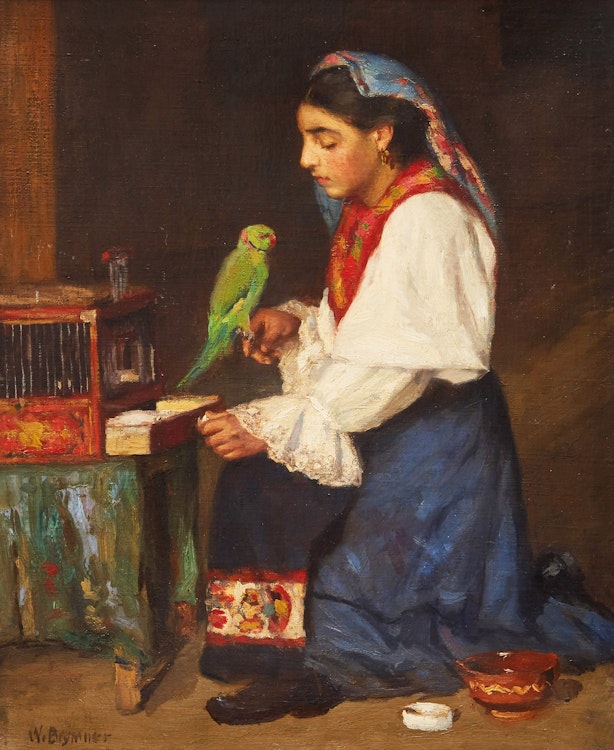Woman with Parrot by William Brymner

William Brymner
Woman with Parrot
oil on canvas
signed lower left
24 x 20 ins ( 61 x 50.8 cms )
Auction Estimate: $9,000.00 - $12,000.00
Price Realized $10,800.00
Sale date: February 1st 2022
Private Collection, Toronto
Share this item with your friends
William Brymner
(1855 - 1925) OSA, RCA
Born in Greenock, Scotland, he arrived in Canada with his parents in 1857. A Canadian painter who initially worked as an architect for the Canadian government, William Brymner took up painting full-time in 1876 and studied at the Academie Julien in Paris under the instruction of W.A. Bougereau and Tony Robert-Fleury. On his return from Paris he became head of the Art Association of Montreal in 1886, a post that he retained for 35 years. The same year he became a full member of the Royal Canadian Academy. In 1899 he painted a canvas entitled “Early Morning in September” a pastoral scene which Dr. Hubbard in his book “The Development of Canadian Art” noted for its “curiously soft and gliding tones”.
Brymner shared his love of landscape with two other fellow Canadian artists, James Wilson Morrice and Maurice Cullen and they took sketching trips to Ste. Anne de Beaupré and to the Ile d’Orleans. Professor Ella Agnes Whitemore writing on Brymner noted “He almost worshipped the art of Constable on which his own was based.” In 1892, Brymner went to Western Canada to do a number of large pictures of Rocky Mountain scenery which were commissioned by the Canadian Pacific Railway. He also had an interest in historical subjects and was one of the artists who aspired to decorate the House of Parliament in Ottawa. His part was to depict the arrival of Cartier on the rounded wall above the doorway of the rotunda but the plan was held in abeyance awaiting government appropriation.
Brymner did considerable painting of figures and interiors of very realistic presentation and the National Gallery of Canada has two fine examples of such nudes in interior settings and another nude executed in a classical vein. Paul Duval noted his work in watercolours and reproduced his “Two Girls Reading” for his book on this medium. Many of Brymer’s watercolours were done on silk and linen and as noted by Paul Duval his silk ones were done “in a fairly large scale”. Brymner is perhaps remembered more today for his teaching activities having had many students pass through his hands who achieved prominence including Wilfred Molson Barnes, Clarence A. Gagnon, Prudence Heward, Randolph S. Hewton, Edwin Holgate, Lilias Torrence Newton, Hal Ross Perrigard, Robert Pilot, Sarah Robertson and Anne Savage. A. Y. Jackson received occasional advice from him but did not study directly under him. William travelled extensively between and throughout Canada and Europe during the course of his career producing a wide variety of sketches, drawings, and paintings.
Perhaps his best known painting is "A Wreath of Flowers" completed in 1884. Another work, "With Dolly at the Sabot-Makers" (1883), has the distinction of being the first painting bought (in 1884, for $90.00) by the then newly established National Gallery of Canada. William married Mary Caroline Massey the daughter of Richard Massey and Caroline Gooch of Chester, Cheshire. Brymner suffered a stroke in 1917 and had to abandon teaching for a time. He left office of President of the Royal Canadian Academy and in 1921 also retired from teaching. He took a trip to Europe with his wife and spent two years at Capri.
William was described in the "Canadian Who Was Who" of 1938 (Trans Canada Press, 1930) as having "a strong personality, tall, slender, typically Scotch in appearance and in religious faith adhering to the Church of Scotland. Brymner was universally beloved by students not only for his craftsmanship, but also for his kindly disposition". It was after a trip to Europe in 1925 that William died at his wife's family home in Cheshire in 1925. He's buried there in the Wallasey cemetery. He is represented in the Quebec Provincial Museum, The Montreal Museum of Fine Arts, The Art Gallery of Ontario, The Beaverbrook Art Gallery, the Art Gallery of Hamilton as well as the National Gallery of Canada. A showing of 89 of his pictures took place at the Art Association of Montreal in the fall of 1926.
Source: "A Dictionary of Canadian Artists, Volume I: A-F", compiled by Colin S. MacDonald, Canadian Paperbacks Publishing Ltd, Ottawa, 1977

